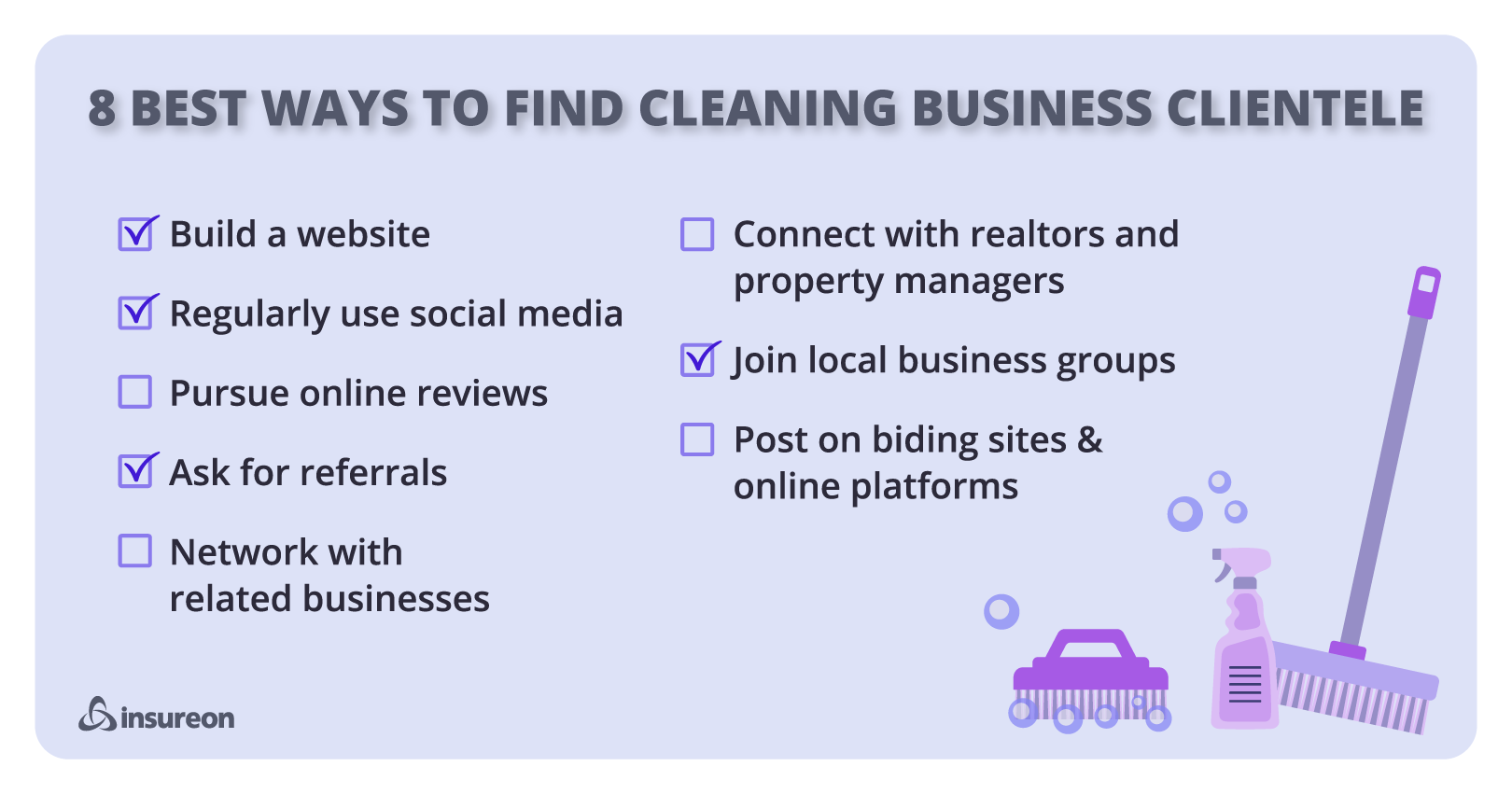How to get commercial cleaning contracts

Owning a commercial cleaning company can be lucrative, but attracting new customers is essential to the success of the business, as is making sure you’re legally and financially secure. This includes janitorial, housekeeping, pressure washing, and other types of cleaning businesses. In this article, we’ll explain how to get commercial cleaning contracts, how to obtain the right business licenses, and what kinds of business insurance you might need.
What is a commercial cleaning contract?
A contract for commercial cleaning services is a document that outlines the parties involved, the services you’ll provide, when you’ll provide them, and how and when you’ll be paid.
Contracts are more preferable to handshake deals, as a contract spells out what both sides expect of each other and reduces the chance of a disagreement. If something goes wrong, having a contract in place is important if you want to take legal action.
It’s a good idea to review your office cleaning contracts on occasion and make updates if your scope of services changes. For example, if a client wants you to clean their office more frequently, you’ll need to make sure this is reflected in a new or amended cleaning contract.
Here’s some of the information that should be included in a cleaning contract:
- The dates and times of when you or your staff will be on the premises
- The types of cleaning jobs to be done, and any exclusions (windows, floors, dishes, etc.)
- The number of people who will perform the cleaning
- How long the contract or agreement will be valid for
- Payment terms, including the amount and timing of payment and any late fees if payment is not received on time
- Contact information for your business and the client

Tips for creating a solid contract
When you’re creating a cleaning contract, especially for the first time, there are some important things to keep in mind. Follow these tips to create a solid cleaning contract before you start working with a new client:
- Be specific: Good cleaning contracts use specific language that ensures all details are clearly and explicitly stated. Avoid using vague or ambiguous verbiage that could be difficult to interpret or raise questions about the services you’re providing.
- Use clear language: Write your commercial cleaning contract with simple, straightforward, and easy-to-understand language. It’s best to leave out technical jargon or terminology your client might not understand.
- Seek legal advice: When creating a contract, it’s always a good idea to consult with a lawyer, especially if you don’t have a legal background. Working with a lawyer will ensure the contract is legally sound and protects your financial and legal interests.
- Review the contract regularly: Remember to review your cleaning contracts on a semi-regular basis. If your services change or you update your pricing, for example, you should amend your cleaning business contracts accordingly.
- Get it in writing: Commercial cleaning contracts should always be written, not a verbal agreement. Once you have the contract in writing, make sure the document is signed by both parties. You should also provide a copy of the signed contract to the client.
How do I find clients for my cleaning business?
Finding new clients for your cleaning business might seem like a daunting task, but there are dozens of marketing strategies to help you land contracts. With the right approaches, you can establish an online presence and build connections with local businesses faster than you might expect.
If you’re wondering how to get cleaning service contracts, here are a few tips for finding new clients and growing your business:
Create a website
Building a website is a must for any commercial business owner who wants to be taken seriously. Fortunately, tools like WordPress make it easy to create a simple website without any web design skills. You could also ask a tech-savvy friend or family member to help or hire your own developer to get started.
If someone looks for your business online, having your own website can make it easy for search engines to find you. Cleaning company websites don’t have to be complex to be effective, but you should include basic information prospective clients want to know, like what services you provide, your service area, pricing information, and contact information.
Facebook and other platforms offer a free and easy way to establish a presence online and use targeted advertising to reach potential clients in your area. Not to mention, it’s a lot easier and much more efficient than cold calling. Keep your social media pages updated with information about your business, like the cleaning services you offer and your prices.
If you don’t have much experience with social media, don’t worry. In many cases, simply having a social media presence is enough – and it can set you apart from competitors.
Pursue online reviews
Yelp, Facebook, and Angi (formerly Angie’s List) are three examples of websites where companies can post information about themselves and solicit reviews. Asking your satisfied customers to post testimonials can also provide a significant boost to your new cleaning business.
Old-fashioned referrals
Even in the technological age, a word-of-mouth campaign is still an effective way to promote your business. If it seems awkward to ask your customers, family, and friends for referrals, you might consider giving them a few business cards and ask them to keep you in mind if they know of anyone who might need your services.
Another effective way to get referrals is to ask current customers to recommend your business to others. As an incentive, you could offer referral perks, like a discount on future cleanings when you sign on a new client they referred.

If you run a home or office cleaning business, you might collaborate with those in similar fields, such as dry cleaners, carpet cleaning services, and window cleaning businesses. If you refer someone to a dry cleaner, for example, make sure the dry cleaner knows you were the one who promoted them.
Connect with realtors and managers
If a home, office, or apartment is being sold or leased, it could present a new opportunity for your business, so getting to know people in your local real estate community could be a huge asset.
If you perform residential cleaning for houses, a real estate agent might promote your services to home buyers and sellers, including Airbnb property owners. If your janitorial services include office cleaning services for commercial businesses, then property managers and office managers might help you acquire new janitorial contracts.
Another source of leads could also be facility management companies that subcontract cleaning services for the organizations they represent.
Join local groups
Your local chamber of commerce will likely offer networking opportunities where you can spread the word about your business. Attending these and other networking events in your area can be a great way to gain customers.
Utilize online platforms and bidding sites
One of the most effective ways to get more cleaning contracts is to use online platforms and bidding websites. Websites like Thumbtack, Angi, and Bark make it easy for people to find professionals and services in their area, like cleaners. To register your business, you’ll create a profile with the services you provide and upfront pricing information. Some of these platforms are free to use, but others charge a fee when you contact a lead.
If your business operates in the Washington D.C. area, you might also look for government and corporate cleaning contract opportunities on sites like SAM.gov. It’s free to register your business and bid on federal government cleaning contracts.

How do I obtain more contracts for my cleaning business?
There are several things you can do to increase your chances of getting more commercial cleaning business contracts. Let's look at some strategies:
Do your research
If you want to attract new customers and succeed in the cleaning industry, you might start by scoping out the competition. You should research things like:
- What are the other cleaning services in your area like?
- What services do they provide, and how well do they perform?
- What’s their online presence like, and do they have favorable reviews?
- What kind of prices do they charge?
- What are their service contracts like?
- How do they promote themselves? Social media? Facebook or Google ads?
The Internet can be a great place to find this information. For example, you might ask prospective customers what their cleaning needs are, how they’re being met, and if they might consider hiring you instead.
Your friends, family, and business contacts might be willing to help you with this. For example, a friend might ask her employer about what kind of cleaning services the employer uses, what they charge, and to offer your company as an alternative.
Create a marketing plan
You should also create your own marketing plan. This doesn’t have to be a huge ordeal. It could be as simple as an outline of what you offer, the types of clients you want to attract, and the best way to reach them.
Some key things to consider are what your specialty is and what sets you apart from the competition. Do you use only environmentally-friendly cleaning products? Do you specialize in cleaning homes, offices, or certain types of spills?
Business cards and flyers can be an effective marketing tool, especially if you can convince your customers to help promote your business. You might offer a discount to an existing customer, such as a free day of cleaning, if one of their referrals results in a new contract for your business.
Prepare an elevator speech
Have an “elevator speech” ready that highlights what your business has to offer. It should be succinct and to the point so you could deliver it to someone in less than a minute. Make sure you practice this, so it seems like a natural conversation, instead of a sales pitch. You might ask friends, family, or your existing customers to give you feedback on your approach.
What licensing do you need to get cleaning contracts?
When you start a cleaning business, you’ll likely need a business license or two.
Many states require a cleaning business license, a certificate of registration, a vendor’s license, or a seller’s permit. Regardless of what it’s called in your state, such licenses allow you to operate legally and provide cleaning services in your state.
If your company name is something other than your legal name, you’ll likely need a Doing Business As (DBA) license. Even if not required, a DBA license has many benefits for you, including:
- Opening bank accounts under your DBA name
- Signing contracts and accepting payments using your DBA name
- Prohibiting others from using the same business name
- Letting potential customers know you’re a legitimate business
You might also need a business license from your local government, so check with your municipal or county clerk’s office on what the requirements are.
What types of insurance and bonding do I need for my cleaning business?
Most commercial cleaning companies are required to carry cleaning business insurance. You may need to show proof of insurance and bonding to gain customers or apply for a cleaning business license.
Janitorial/surety bonds may be required to secure commercial contracts, especially with larger clients. A janitorial or surety bond is a type of financial contract between your business, your customer, and the insurance company that issued the bond. The bond stipulates the insurance company will reimburse the client if your business fails to deliver on a contract for services.
Here are the types of business insurance for cleaning companies you may need:
General liability insurance
General liability insurance insures you against common business risks like customer injuries, customer property damage, and advertising injury. It’s often the first insurance policy bought by small business owners.
For example, imagine one of your staff accidentally spilled bleach on a client's $5,000 rug. In this case, your general liability insurance policy would pay to replace the rug with a new one. If the client sued your business for the ruined rug, it would also cover your legal fees.
Commercial property insurance
Commercial property insurance pays to repair or replace stolen, lost, or damaged business property. It covers your business’s physical location and other assets, like equipment.
Some examples of business property that’s covered includes vacuum cleaners, mops, cleaning chemicals, and other supplies used on cleaning jobs. If your office space gets damaged, it’ll also pay to replace things like furniture, electronics, and fixtures.
Business owner's policy (BOP)
A business owner’s policy (BOP) is a bundle that includes general liability insurance and commercial property insurance. BOPs are beneficial for many cleaning businesses because they provide coverage for liability claims and property damage claims that can cause unexpected financial consequences.
The main benefit of a BOP is cost savings. This policy bundle typically costs less than if the policies were bought separately.
With the right approaches, you can establish an online presence and build connections with local businesses faster than you might expect.
Workers' compensation insurance
Workers’ compensation insurance is required in most states for businesses with employees. It covers the medical costs and lost wages for yourself and your employees for work-related accidents and illnesses, which your personal health insurance is unlikely to cover.
Let’s say one of your employees develops a back injury from repeated vacuuming. They see a doctor who recommends physical therapy and several weeks off work. In this situation, the employee could file a workers’ compensation claim to get their medical treatment covered and collect partial lost wages while they’re unable to work.
Commercial auto insurance
Commercial auto insurance covers your legal bills, medical expenses, and property damage if one of your business-owned vehicles is in an accident. Commercial car insurance is required in nearly every state if your company uses business-owned cars or vans to drive to cleaning jobs.
For example, imagine you’re driving to a client’s office, and you accidentally rear-end another vehicle. The other person’s vehicle has bumper damage and wants to file an insurance claim. The property damage portion of your commercial car insurance policy would pay for the other car’s repairs.
Like personal car insurance, commercial auto insurance provides third-party bodily injury and property damage coverage. The minimum required coverage limits depend on your state. You also have the option to add other policies, like collision insurance, comprehensive insurance, and uninsured/underinsured motorist insurance.
Hired and non-owned auto insurance
Hired and non-owned auto insurance covers your personal, leased, or rented vehicles when used for work purposes. If you’re in an accident while visiting client office buildings or picking up cleaning supplies, your personal auto insurance is unlikely to cover you for a work-related mishap.
For instance, say you’re driving your personal vehicle to a client’s home for a cleaning. Another driver runs a stop sign and slams into the side of your car. Because you were driving for business purposes, your personal auto insurance company won’t cover the claim. In this case, hired and non-owned auto insurance would kick in and pay to repair the vehicle.
Commercial umbrella insurance
Commercial umbrella insurance provides additional coverage for liability claims made on general liability, commercial auto, or employer’s liability insurance once a policy’s limit is reached.
For example, if an employee accidentally damaged a valuable art piece while dusting and the client sued your business, commercial umbrella insurance would provide additional legal protection beyond what your general liability policy would pay for.
Commercial umbrella insurance can also provide higher coverage limits for employer’s liability claims, which can be very expensive. Employer’s liability insurance covers your business’s legal fees if an employee sues over an injury or illness that happened at work.
Protect your cleaning business with Insureon
To purchase business insurance for your cleaning company, complete Insureon’s easy online application to compare insurance quotes from top-rated U.S. insurance companies.
If you need assistance choosing the right policies or selecting your coverage limits, you can consult with an insurance agent at any point in the process. A licensed agent can also help you get the cheapest business insurance with the protection you need.
Once you find the right insurance coverage for your small business, you can begin coverage in less than 24 hours and download a certificate of insurance (COI).
Elizabeth Rivelli, Contributing Writer
Elizabeth is a freelance writer with extensive experience covering commercial insurance and personal insurance lines. Her work has been featured in dozens of online finance publications, including Forbes, Bankrate, and Investopedia. Elizabeth also writes for several insurance carriers.









